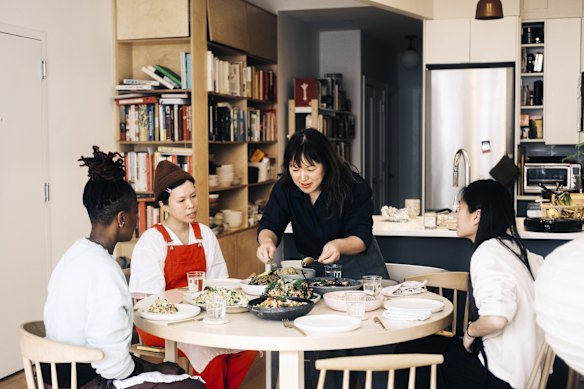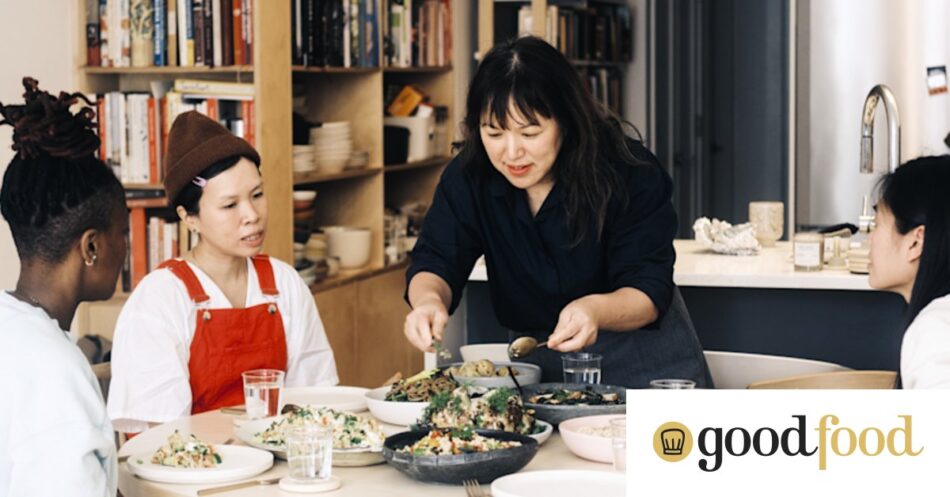In her latest cookbook, the Australian food writer chucks out the rule book and says almost anything can be salad.

Hetty McKinnon has built a career proving that you can, in fact, make friends with salad. The Chinese-Australian food writer is challenging traditional notions of food and entertaining, one dish at a time.
Now based in New York City, McKinnon has released her latest cookbook, Linger, which she describes as an “anti-dinner party book”.
McKinnon wants to inspire a new kind of gathering: one filled with intimate, spontaneous meals where people can forget the idea that a salad is just a bowl of leafy greens.

This isn’t a new concept for McKinnon; her food journey began in Sydney in 2011 with Arthur Street Kitchen, a business where she delivered salads to her Surry Hills neighbours by bike.
That business led to her 2013 cookbook Community, which quickly achieved cult status and cemented her reputation as a salad whizz whose recipes regularly feature in The New York Times.
McKinnon credits her Chinese-Australian heritage with helping her think differently about texture and flavour. “Being Chinese growing up in Australia, I struggled with my identity a bit, wondering where I belonged. But now, decades on, I see it as an advantage.”
During a recent tour of Australia to launch Linger, McKinnon told Good Food, “I’ve always thought that Australia is more evolved in the salad-scape. In the US, it’s still sometimes a bit of a challenge.”
In Linger, she dives even deeper into her unique approach, proving that almost anything can be a salad. “When I’m being my most creative in the kitchen and in my recipe development work, it’s when I’m working on a salad because the options are endless.”
“I’ve always thought that Australia is more evolved in the salad-scape. In the US, it’s still sometimes a bit of a challenge.”
Hetty McKinnon
The advantage of serving salads as the main event is that you can prepare them ahead, and spend more time with your guests.
“Most salads should be served at room temperature, so it is fine to make it an hour before and leave it out,” she says. “They’re also great for meal prepping for like lunches and things like that.”
Besides, a well-crafted salad requires as many ingredients and as much effort as a stew or a pasta dish, but is often better received, says McKinnon.
“I have this theory that when you serve people salad, they’re so much more grateful than if you serve them another dish. Somehow there’s a perception that salads are hard, and they take a lot of effort, but they really don’t.”
Five tips for better salads
- Make the dressing a day or two ahead, and keep it in the fridge or on the bench. The flavour will improve, and it will save you time later.
- Always keep some vegetables on hand, including peas and corn in the freezer. Feeling as if you have to head out to the shops before cooking will hold you back.
- Build up a supply of flavour-boosting condiments such as miso, tahini and chilli crisp. “Chilli crisp is everywhere. It’s ubiquitous, but it’s ubiquitous for a reason.”
- Add extra flavour with spices such as ground cumin, coriander, turmeric and paprika. “When I develop recipes, I try not to use fancy spices, but those are basics that I think everyone should own.”
- It’s OK to eat out-of-season tomatoes. “They’re not going to be as good, but like sometimes I don’t want to eat just root vegetables all winter.”









